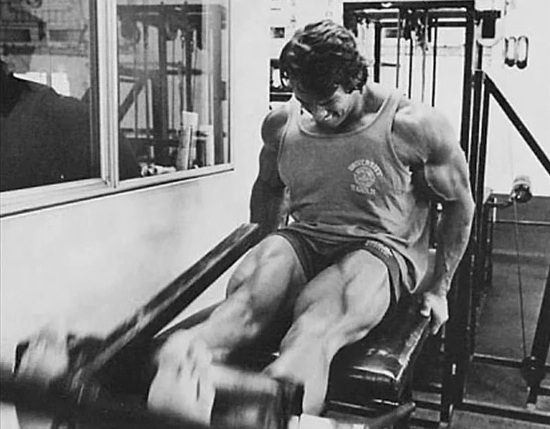One of the most common complaints of aspiring body-builders looking for balance from head to toe is that they just can’t get their quads to grow. If this describes your situation, I offer one solution that could help: pre-exhaustion.

See, the problem many people have is that their biggest muscles (in this case, the quads) are much stronger in comparison to the smaller assisting muscles (the glutes and hamstrings).
So if you’re doing sets of squats, your quadriceps might be ready to continue but your glutes or hams may tire, causing you to end your set before you’ve thoroughly worked your quads. Obviously, this isn’t a problem for everyone.
But for those who have to deal with overpowering quads, one effective strategy is to pre-exhaust the area by doing isolation exercises before your compound moves so your quads fail at more or less the same time as your glutes and hamstrings do.

The Layout
If you were doing, say, 3-4 exercises for your quads, you’d typically do squats and leg presses first, then finish with leg extensions. But extensions are the only exercise that fatigue just your quads, so I advise doing them first in your workout. Do 4-5 working sets of extensions right off the bat, and to failure. By the time you move on to squats, leg presses and/or hack squats, your quads will be fatigued while the smaller muscles are still fresh, putting the three bodyparts on a level playingfield. I like to think of it as the quads getting a head start on exhaustion, which will ultimately lead to greater gains in size and definition.
When doing squats and leg presses, your quads will already be tired even on the very first set and you’ll have to use less weight than normal. But don’t think that using lighter poundages won’t allow for enough stimulus to cause muscle growth. That’s the beauty of pre-exhaust: You end up using less weight while training your quads more intensely.

I’ve always believed that the pre-exhaust technique is best suited to experienced lifters who have already achieved a high degree of mass, strength and muscle density by consistently using conventional training methods for a number of years.
By conventional, I mean performing compound exercises (for the thighs, squats and leg presses) before isolation moves (leg extensions). In this sense, pre-exhaust training becomes something of a plateau-buster. For those of you who have never used the pre-exhaustion technique for your lower body, consider doing all your compound exercises on machines at first (Smith machine, hack squat machine, etc.) rather than with free weights, since doing free-weight squats when your quads are extremely tired can be an injury hazard.
This idea may sound counterintuitive, but try pre-exhaust for yourself. You’ll be pleasantly surprised with the potential thigh-expanding results.
Pre-Exhaust Leg Routine
Shock your quads on your next leg day with this sample workout.

Note: Take each set to failure
Author: Jimmy Pena, MS, CSCS
References:
http://www.muscleandfitness.com/
http://www.flexonline.com/
COPYRIGHT 2010 Weider Publications
COPYRIGHT 2010 Gale Group










